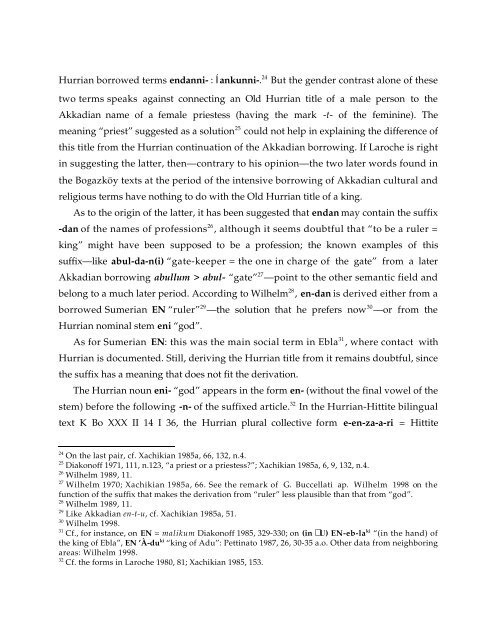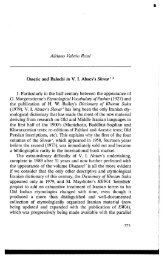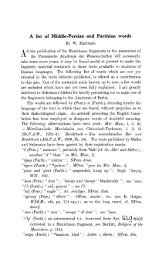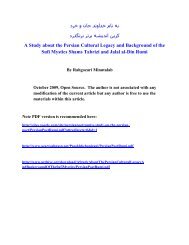Comparative Notes on Hurro-Urartian, Northern Caucasian
Comparative Notes on Hurro-Urartian, Northern Caucasian
Comparative Notes on Hurro-Urartian, Northern Caucasian
You also want an ePaper? Increase the reach of your titles
YUMPU automatically turns print PDFs into web optimized ePapers that Google loves.
Hurrian borrowed terms endanni- : Íankunni-. 24 But the gender c<strong>on</strong>trast al<strong>on</strong>e of these<br />
two terms speaks against c<strong>on</strong>necting an Old Hurrian title of a male pers<strong>on</strong> to the<br />
Akkadian name of a female priestess (having the mark -t- of the feminine). The<br />
meaning “priest” suggested as a soluti<strong>on</strong> 25 could not help in explaining the difference of<br />
this title from the Hurrian c<strong>on</strong>tinuati<strong>on</strong> of the Akkadian borrowing. If Laroche is right<br />
in suggesting the latter, then—c<strong>on</strong>trary to his opini<strong>on</strong>—the two later words found in<br />
the Bo azköy texts at the period of the intensive borrowing of Akkadian cultural and<br />
religious terms have nothing to do with the Old Hurrian title of a king.<br />
As to the origin of the latter, it has been suggested that endan may c<strong>on</strong>tain the suffix<br />
-dan of the names of professi<strong>on</strong>s 26 , although it seems doubtful that “to be a ruler =<br />
king” might have been supposed to be a professi<strong>on</strong>; the known examples of this<br />
suffix—like abul-da-n(i) “gate-keeper = the <strong>on</strong>e in charge of the gate” from a later<br />
Akkadian borrowing abullum > abul- “gate” 27 —point to the other semantic field and<br />
bel<strong>on</strong>g to a much later period. According to Wilhelm 28 , en-dan is derived either from a<br />
borrowed Sumerian EN “ruler” 29 —the soluti<strong>on</strong> that he prefers now 30 —or from the<br />
Hurrian nominal stem eni “god”.<br />
As for Sumerian EN: this was the main social term in Ebla 31 , where c<strong>on</strong>tact with<br />
Hurrian is documented. Still, deriving the Hurrian title from it remains doubtful, since<br />
the suffix has a meaning that does not fit the derivati<strong>on</strong>.<br />
The Hurrian noun eni- “god” appears in the form en- (without the final vowel of the<br />
stem) before the following -n- of the suffixed article. 32 In the Hurrian-Hittite bilingual<br />
text K Bo XXX II 14 I 36, the Hurrian plural collective form e-en-za-a-ri = Hittite<br />
24 On the last pair, cf. Xachikian 1985a, 66, 132, n.4.<br />
25 Diak<strong>on</strong>off 1971, 111, n.123, “a priest or a priestess?”; Xachikian 1985a, 6, 9, 132, n.4.<br />
26 Wilhelm 1989, 11.<br />
27 Wilhelm 1970; Xachikian 1985a, 66. See the remark of G. Buccellati ap. Wilhelm 1998 <strong>on</strong> the<br />
functi<strong>on</strong> of the suffix that makes the derivati<strong>on</strong> from “ruler” less plausible than that from “god”.<br />
28 Wilhelm 1989, 11.<br />
29 Like Akkadian en-t-u, cf. Xachikian 1985a, 51.<br />
30 Wilhelm 1998.<br />
31 Cf., for instance, <strong>on</strong> EN = malikum Diak<strong>on</strong>off 1985, 329-330; <strong>on</strong> (in ) EN-eb-la ki “(in the hand) of<br />
the king of Ebla”, EN ’À-du ki “king of Adu”: Pettinato 1987, 26, 30-35 a.o. Other data from neighboring<br />
areas: Wilhelm 1998.<br />
32 Cf. the forms in Laroche 1980, 81; Xachikian 1985, 153.





